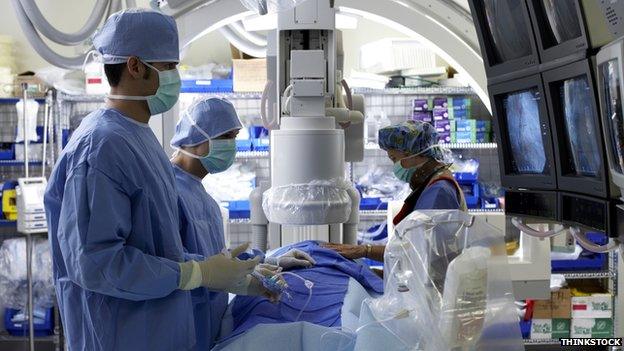Scottish independence: Think tank claims threat to NHS
- Published

The Institute for Fiscal Studies says an independent Scotland would find it harder to protect the NHS.
The think-tank said that, even with the higher oil revenues predicted by the Scottish Government, Scotland would need to borrow more - or tax more - to increase spending on the heath service.
Scottish Health Secretary Alex Neil said, after a "No" vote, the Scottish budget would face continued cuts.
He said that would make it hard to protect health spending.
The Institute for Fiscal Studies is regarded as a centre-right think tank and is based in London but has no affiliations to either side of the referendum debate.
In an article published on its website the IFS says that, until 2015/16, Scotland will not have to cut public spending to the same degree as the rest of the UK if it stays in the union. This is because Scotland receives more through the Barnett formula than other parts of the UK. Overall spending will fall in Scotland by about 8% rather than 13% in England.
The authors, Paul Johnson and David Phillips, point out that the Scottish Government has not chosen to protect the NHS from budget cuts to the same degree as England. Spending on the NHS in Scotland in real terms will have fallen by 1% between 2009/10 - 2015/16 compared to a 4% increase in England.
In the future, they say, an independent Scotland would probably not be able to end "austerity" and would have to continue to make spending cuts because of the debt it would inherit.
Even based on the Scottish Government's more optimistic oil forecasts, Scotland would have a weaker budget than the rest of the UK and would have to tax more or borrow more to increase NHS spending.
The authors concede that faster economic growth after independence would "square all these circles." They say this is possible but "not certain by any means."
'Continued cuts'
Scottish Health Secretary Alex Neil said: "The IFS recognises in their report today that if there was a No vote Scotland would 'face continued cuts to its block grant until 2018-19', and that further cuts 'will make it harder for both the Scottish and UK governments to continue to protect NHS spending' - the cuts to other unprotected areas would need to be very large.
"But without such protection, managing the rising demand for and costs of health care would likely be difficult indeed.
"The No campaign's answer to Westminster cuts is to increase tax in Scotland. Why should hard working families in Scotland be forced to pay for the cuts to public spending from a Government they did not elect?"
Mr Neil added: "With independence we can end austerity and use the vast wealth of Scotland to support our vital public services, like the NHS, rather than just try to mitigate the impact of the damaging decisions of Westminster."
'Impartial report'
Speaking on behalf of the Better Together campaign, Scottish Labour Leader Johann Lamont said: "The SNP lies about our NHS have been the most shameful piece of political campaigning I have ever seen. They have deliberately misled the Scottish public, and preyed on the fears of the most vulnerable people in our communities to bully them into voting for separation.
"This expert, impartial report has exposed that what Alex Salmond, Nicola Sturgeon, Alex Neil and the rest of the nationalist campaign are saying about the NHS is completely untrue.
"The reality is, separation would see those with the least lose the most. It would mean huge austerity to our public services, our schools and our hospitals.
"Why take the huge risk of separation when change is coming with No vote?"
This afternoon the co-founder of NHS for Yes, Dr Willie Wilson, said, "The immediate danger of a No vote to NHS Scotland lies mainly in the £25 billion of additional austerity cuts which are promised from Westminster from next year.
"Since our NHS budget uses 40% of our total block grant, and so many savings have already been made in other spending departments, NHS Scotland would inevitably suffer cuts if there was a No vote."
He added: "Multinational healthcare companies are currently enjoying a feeding frenzy with English NHS contracts already exceeding £10 billion."